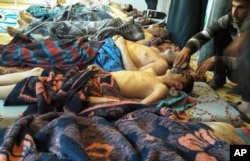Russia, Syria and Iran have warned the United States against launching new strikes on Syria and called for an international investigation into the chemical weapons attack in Syria.
The foreign ministers from Russia, Syria and Iran, meeting Friday in Moscow, said any further unilateral action by the U.S. in Syria would be met with "grave consequences" and pose a danger to the entire world.
The U.S. fired 59 Tomahawk missiles at Syria's al-Shayrat air base last week in response to a chemical weapons attack in Syria days earlier.
Russian Foreign Minister Sergei Lavrov said the circumstances surrounding the chemical attack in the Syrian town of Khan Sheikhoun that killed more than 80 people were still not clear.
He criticized the world's chemical weapons watchdog, the Organization for the Prohibition of Chemical Weapons, for not sending experts to the site of the attack to investigate.
"We consider it unacceptable to analyze events from a distance," he said. Lavrov said the investigation should also be widened to include experts from many nations.
Russia has rejected accusations from Western countries that Syrian President Bashar al-Assad was behind the attack. Russia has alleged that the victims were killed when Syrian warplanes hit a rebel chemical arsenal. The U.S. accuses Assad of deliberately launching the attack.
"The use of chemical weapons as a pretext for violation of the sovereignty and territorial integrity of an independent state — a member of the United Nations — is a very dangerous activity," Iranian Foreign Minister Mohammad Javad Zarif said. "It is essential to prevent such acts as the events in Khan Sheikhoun in [the] future."
Lavrov said the U.S. missile strike on Syria was Washington seeking "excuses for regime change." He added, "These attempts will not succeed, this will not happen."
Lavrov met Friday with his counterparts from Syria and Iran after U.S. Secretary of State Rex Tillerson visited Moscow earlier this week. Syrian Foreign Minister Walid Moallem said Friday's meeting sent a "strong message" to Washington.
Russia and Iran are strong allies of Assad's government and have backed the president during Syria's six-year civil war.







